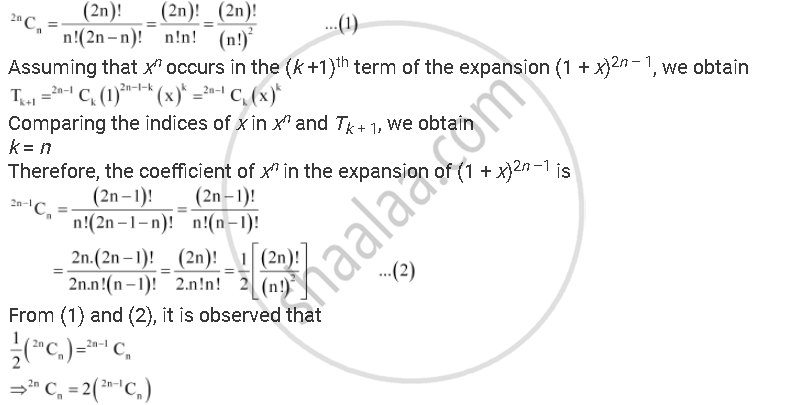Advertisements
Advertisements
Question
Prove that the coefficient of xn in the expansion of (1 + x)2n is twice the coefficient of xn in the expansion of (1 + x)2n–1 .
Solution

Comparing the indices of x in xn and in Tr + 1, we obtain
r = n
Therefore, the coefficient of xn in the expansion of (1 + x)2n is

Therefore, the coefficient of xn in the expansion of (1 + x)2n is twice the coefficient of xn in the expansion of (1 + x)2n–1.
Hence, proved.
APPEARS IN
RELATED QUESTIONS
Find the coefficient of a5b7 in (a – 2b)12
Write the general term in the expansion of (x2 – y)6
In the expansion of (1 + a)m + n, prove that coefficients of am and an are equal.
Find the middle term in the expansion of:
(i) \[\left( \frac{2}{3}x - \frac{3}{2x} \right)^{20}\]
Find the middle term in the expansion of:
(ii) \[\left( \frac{a}{x} + bx \right)^{12}\]
Find the middle terms in the expansion of:
(i) \[\left( 3x - \frac{x^3}{6} \right)^9\]
Find the middle terms(s) in the expansion of:
(i) \[\left( x - \frac{1}{x} \right)^{10}\]
Find the middle terms(s) in the expansion of:
(ii) \[\left( 1 - 2x + x^2 \right)^n\]
Find the term independent of x in the expansion of the expression:
(v) \[\left( \frac{\sqrt{x}}{3} + \frac{3}{2 x^2} \right)^{10}\]
Find the term independent of x in the expansion of the expression:
(ix) \[\left( \sqrt[3]{x} + \frac{1}{2 \sqrt[3]{x}} \right)^{18} , x > 0\]
Find the term independent of x in the expansion of the expression:
(x) \[\left( \frac{3}{2} x^2 - \frac{1}{3x} \right)^6\]
If the coefficients of \[\left( 2r + 4 \right)\text{ th and } \left( r - 2 \right)\] th terms in the expansion of \[\left( 1 + x \right)^{18}\] are equal, find r.
If the coefficients of (2r + 1)th term and (r + 2)th term in the expansion of (1 + x)43 are equal, find r.
Prove that the coefficient of (r + 1)th term in the expansion of (1 + x)n + 1 is equal to the sum of the coefficients of rth and (r + 1)th terms in the expansion of (1 + x)n.
The coefficients of 5th, 6th and 7th terms in the expansion of (1 + x)n are in A.P., find n.
Find a, if the coefficients of x2 and x3 in the expansion of (3 + ax)9 are equal.
Find the coefficient of a4 in the product (1 + 2a)4 (2 − a)5 using binomial theorem.
If 3rd, 4th 5th and 6th terms in the expansion of (x + a)n be respectively a, b, c and d, prove that `(b^2 - ac)/(c^2 - bd) = (5a)/(3c)`.
If the 2nd, 3rd and 4th terms in the expansion of (x + a)n are 240, 720 and 1080 respectively, find x, a, n.
If the term free from x in the expansion of \[\left( \sqrt{x} - \frac{k}{x^2} \right)^{10}\] is 405, find the value of k.
Write the middle term in the expansion of `((2x^2)/3 + 3/(2x)^2)^10`.
Write the total number of terms in the expansion of \[\left( x + a \right)^{100} + \left( x - a \right)^{100}\] .
If an the expansion of \[\left( 1 + x \right)^{15}\] , the coefficients of \[\left( 2r + 3 \right)^{th}\text{ and } \left( r - 1 \right)^{th}\] terms are equal, then the value of r is
The middle term in the expansion of \[\left( \frac{2 x^2}{3} + \frac{3}{2 x^2} \right)^{10}\] is
Find the middle term in the expansion of `(2ax - b/x^2)^12`.
The ratio of the coefficient of x15 to the term independent of x in `x^2 + 2^15/x` is ______.
Find the term independent of x in the expansion of `(3x - 2/x^2)^15`
Find the middle term (terms) in the expansion of `(x/a - a/x)^10`
If p is a real number and if the middle term in the expansion of `(p/2 + 2)^8` is 1120, find p.
Show that the middle term in the expansion of `(x - 1/x)^(2x)` is `(1 xx 3 xx 5 xx ... (2n - 1))/(n!) xx (-2)^n`
If xp occurs in the expansion of `(x^2 + 1/x)^(2n)`, prove that its coefficient is `(2n!)/(((4n - p)/3)!((2n + p)/3)!)`
Find the term independent of x in the expansion of (1 + x + 2x3) `(3/2 x^2 - 1/(3x))^9`
If the middle term of `(1/x + x sin x)^10` is equal to `7 7/8`, then value of x is ______.
The number of terms in the expansion of [(2x + y3)4]7 is 8.
If the expansion of `(x - 1/x^2)^(2n)` contains a term independent of x, then n is a multiple of 2.
Let for the 9th term in the binomial expansion of (3 + 6x)n, in the increasing powers of 6x, to be the greatest for x = `3/2`, the least value of n is n0. If k is the ratio of the coefficient of x6 to the coefficient of x3, then k + n0 is equal to ______.
